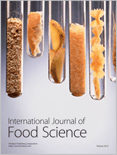
International Journal of Food Science
Scope & Guideline
Exploring Innovative Solutions for Global Food Challenges
Introduction
Aims and Scopes
- Food Microbiology and Safety:
Research in this area encompasses the study of microorganisms affecting food products, including pathogens and probiotics. The journal emphasizes the importance of food safety practices and microbial quality assessments. - Nutritional Science and Health:
This scope includes studies on the nutritional profile of foods, functional foods, and the health benefits associated with dietary choices. It aims to address public health issues related to nutrition and food consumption. - Food Quality and Sensory Analysis:
Research focusing on the physicochemical properties, sensory evaluation, and quality control of food products. This area aims to enhance consumer acceptance and marketability through quality improvements. - Food Processing and Technology:
Investigations into various food processing techniques, including thermal and non-thermal methods, extraction technologies, and their effects on food properties and safety. - Phytochemistry and Natural Products:
Exploration of plant-derived compounds, their extraction, characterization, and applications in food preservation and health, highlighting the role of bioactive substances. - Sustainable Food Systems and Waste Management:
Research on the utilization of food by-products, sustainable practices in food production and processing, and their impact on environmental sustainability.
Trending and Emerging
- Plant-based Foods and Alternatives:
Research on plant-based diets, alternative protein sources, and functional plant-based products is on the rise, reflecting growing consumer interest in health and sustainability. - Food Biotechnology and Innovations:
Emerging topics in biotechnology, including genetic modifications and novel food processing techniques, are gaining prominence, highlighting advancements in the food industry. - Health and Functional Foods:
There is an increasing focus on foods with health-promoting properties, such as functional ingredients, nutraceuticals, and their role in disease prevention and management. - Food Waste Reduction and Valorization:
Research on reducing food waste and utilizing by-products for value-added products is trending, aligning with global sustainability goals. - Food Safety and Quality Assurance Technologies:
Innovative technologies for monitoring food safety and quality, including analytical methods and smart packaging solutions, are becoming increasingly relevant.
Declining or Waning
- Traditional Fermented Foods:
Research on traditional fermented foods is becoming less prominent, possibly due to increased interest in novel fermentation technologies and probiotic innovations. - Food Adulteration and Detection Methods:
Though still relevant, the frequency of publications focusing on food adulteration detection methods is decreasing, as researchers shift towards exploring broader food quality and safety topics. - Animal-based Food Products:
There is a noticeable decline in studies solely focused on animal-based food products, as the journal increasingly features plant-based alternatives and vegan options.
Similar Journals
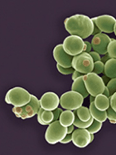
Annual Review of Food Science and Technology
Pioneering the Future of Food ScienceThe Annual Review of Food Science and Technology, published by ANNUAL REVIEWS, is an esteemed journal dedicated to advancing the knowledge within the field of food science. With an impressive Q1 ranking in the Food Science category, and ranking as #6 out of 389 in the Scopus Agricultural and Biological Sciences category, the journal serves as a vital resource for researchers, professionals, and students. This publication encapsulates comprehensive reviews and cutting-edge research, helping to bridge the gap between research and practical application. Though it does not offer Open Access, it provides valuable insights into various aspects of food science from 2010 to 2024, ensuring that its readership stays at the forefront of emerging trends and innovations. The journal's focus on high-quality, peer-reviewed articles makes it a critical platform for scholars looking to deepen their understanding and contribute to this rapidly evolving field.
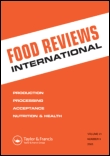
FOOD REVIEWS INTERNATIONAL
Bridging Academia and Industry in Food ScienceFOOD REVIEWS INTERNATIONAL, published by Taylor & Francis Inc, serves as a pivotal resource within the fields of Food Science and Chemical Engineering. Established in 1985, this esteemed journal offers a comprehensive platform for the dissemination of critical reviews that enhance understanding and innovation in the food industry. With an impressive impact factor reflecting its Q1 quartiles in both Food Science and Chemical Engineering categories, it ranks among the top journals in Scopus, securing the 24th spot in Agricultural and Biological Sciences. Scholars, researchers, and professionals are encouraged to explore its rich content, which spans meticulously reviewed articles that bridge academic research and practical applications, while contributing to advancements in food safety, processing, and sustainability. Although not an Open Access journal, access to its extensive repository is vital for anyone aiming to stay at the forefront of food science advancements.
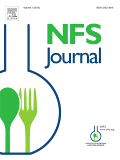
NFS Journal
Pioneering discoveries that nourish the future.NFS Journal, published by ELSEVIER, is at the forefront of research in the fields of Food Science and Nutrition and Dietetics, boasting an impressive impact factor that underscores its significance. With an Open Access model since 2015, the journal facilitates widespread dissemination and accessibility of high-quality research, making it a valuable resource for scholars and practitioners alike. Located in Germany, this journal has made its mark with its prestigious Q1 ranking in both Food Science and Nutrition and Dietetics as of 2023, positioning it among the top-tier journals in these disciplines. Additionally, it holds an outstanding standing in Scopus rankings, being placed at 10th out of 140 in Nutrition and Dietetics and at 27th out of 389 in Food Science, reflecting its influence and reach within the global academic community. The NFS Journal is dedicated to publishing the latest advancements and practices that shape our understanding of the relationship between food, health, and nutrition, appealing to researchers, professionals, and students eager to stay updated with novel insights and breakthroughs.

Food Production Processing and Nutrition
Navigating the future of food processing and nutrition.Food Production Processing and Nutrition, published by SpringerNature, stands at the forefront of advancing knowledge in the vibrant fields of food science, nutrition, and public health. This esteemed Open Access journal, operational since 2019, plays a pivotal role in disseminating breakthrough research that intersects food production processes with nutritional insights, making it an invaluable resource for researchers, professionals, and students alike. With a commendable 2023 impact factor reflecting its robust scholarly contributions — Q1 in Food Science and Q2 in both Nutrition and Dietetics and Public Health, Environmental and Occupational Health — the journal not only emphasizes the importance of innovative food processing methods but also addresses pressing nutritional challenges faced globally. Located in the United Kingdom, it claims an impressive Scopus ranking, with a notable percentile standing across various categorical metrics. As such, Food Production Processing and Nutrition is essential for anyone aiming to deepen their understanding of how food systems impact public health through effective processing and nutritional strategies.
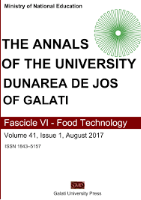
Annals of the University Dunarea de Jos of Galati, Fascicle VI-Food Technology
Empowering Knowledge in Food ProcessingAnnals of the University Dunarea de Jos of Galati, Fascicle VI-Food Technology is a distinguished academic journal published by GALATI UNIV PRESS, dedicated to advancing knowledge in the field of food technology. With an open access format since 2007, this journal enhances accessibility to research findings and facilitates the dissemination of innovative ideas among researchers, professionals, and students worldwide. The journal holds a noteworthy position in its category, boasting a 2023 Q3 ranking in both Food Science and Industrial and Manufacturing Engineering, indicating its relevance and contribution to these critical fields. As it converges years of publication from 2012 to 2023, it encapsulates an evolving body of knowledge that reflects the latest advancements and research trends. Although it may not yet have a defined HIndex, its presence in Scopus with ranks of #253 in Industrial and Manufacturing Engineering and #278 in Food Science underscores its emerging impact. This journal is particularly significant for those engaged in research related to food technology and engineering, facilitating dialogue and collaboration within the community while addressing pressing challenges and innovations in food processing and safety. With its commitment to quality research, Annals of the University Dunarea de Jos of Galati serves as an essential resource for fostering knowledge and promoting scientific discussion.

Current Research in Food Science
Fostering Collaboration for a Sustainable Food FutureCurrent Research in Food Science is a leading peer-reviewed academic journal published by Elsevier, specializing in the dynamic field of food science. Since its transition to an Open Access model in 2019, the journal has broadened its reach, contributing significantly to the dissemination of high-quality research. With strong rankings, including a Q1 quartile status in Applied Microbiology and Biotechnology, Biotechnology, and Food Science, it stands out as a pivotal resource for scholars. Based in the Netherlands, current research published within its pages spans a wide range of relevant topics, ensuring that researchers and practitioners stay abreast of the latest advancements. The journal's impressive Scopus rankings enhance its credibility, with a percentile standing in the 74th to 83rd range across relevant categories, underscoring its impact and importance in the academic community. Current Research in Food Science aims to foster the exchange of innovative ideas and foster collaborative efforts among researchers, making it an essential resource for those engaged in advancing the science and technology of food.

Acta Scientiarum Polonorum-Technologia Alimentaria
Advancing Food Science Through Innovative ResearchActa Scientiarum Polonorum-Technologia Alimentaria, published by Poznan University of Life Sciences, is a revered journal in the field of food science, showcasing cutting-edge research and innovations in food technology. Established as a leading platform within its domain, this journal is indexed under Scopus and ranks in the 2023 Q3 quartile for Food Science, demonstrating its commitment to high-quality scholarship. With an ISSN of 1644-0730 and E-ISSN 1898-9594, it serves as a critical resource for researchers, professionals, and students seeking to stay at the forefront of advancements in food safety, quality control, and sustainable practices. The journal has also been recognized for its contributions to the agricultural and biological sciences, positioning itself at rank #205 out of 389 in this competitive field. While currently not offering open access, the journal's valuable insights and findings, especially as it publishes through 2024, play a crucial role in advancing knowledge and fostering collaboration among experts in the food science sector.

Journal of Food and Nutrition Research
Unveiling the Future of Food and Dietary HealthJournal of Food and Nutrition Research, published by the VUP FOOD RESEARCH INST in Bratislava, Slovakia, serves as a vital platform for disseminating cutting-edge research in the fields of food science and nutrition. With an ISSN of 1336-8672 and an E-ISSN of 1338-4260, this journal emphasizes the importance of interdisciplinary approaches to address contemporary challenges related to food quality, dietary practices, and nutritional health. Notably recognized in the 2023 Scopus rankings, the journal is classified in Q3 quartiles for both Food Science and Nutrition & Dietetics, providing a forum for researchers aiming to enhance knowledge and practices within these domains. Those engaged in academia and industry will find the journal invaluable for its comprehensive scope, which covers novel food technologies, nutrition interventions, and the implications of dietary behaviors. Though not open access, the journal is dedicated to enriching the academic conversation and contributing to advancements in public health and nutrition policies.
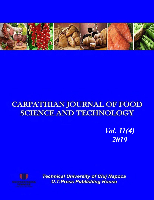
Carpathian Journal of Food Science and Technology
Unleashing Knowledge in Food Science and TechnologyCarpathian Journal of Food Science and Technology, a distinguished publication from the NORTH UNIV CENTER BAIA MARE, has been a pivotal platform for disseminating groundbreaking research in the field of food science since its inception in 2009. With an ISSN of 2066-6845 and an E-ISSN of 2344-5459, this Open Access journal aims to promote knowledge and innovation, offering unrestricted access to its content, thereby enhancing visibility for authors and facilitating a wider readership. Based in Romania, the journal plays a crucial role in advancing scientific inquiry within the agricultural and biological sciences, particularly focusing on contemporary food science issues. As it continues its convergence through 2024, the journal currently holds a Q4 ranking in the Food Science category, allowing it to carve out a unique niche within the academic community despite its current Scopus percentile ranking of 19th. Scholars, researchers, and students in the field will find the journal an invaluable resource for the latest advancements and discussions, making it an essential addition to their academic pursuits.

Journal of Food Science and Technology-Ukraine
Enhancing Nutritional Quality Through Cutting-Edge ResearchJournal of Food Science and Technology-Ukraine, published by the Odesa National University of Technology, stands as a pivotal platform dedicated to the dissemination of high-quality research in the field of food science and technology. With its open access policy established in 2014, the journal fosters global knowledge sharing and accessibility, enabling researchers, professionals, and students to access critical findings and advancements in food technology without barriers. The journal's commitment to publishing innovative studies, reviews, and case analyses reinforces its role in addressing contemporary challenges in food safety, preservation, processing, and nutritional quality. With ISSN 2073-8684 and E-ISSN 2409-7004, it serves as a valuable resource for the academic community, supporting the advancement of food science knowledge and its practical applications.